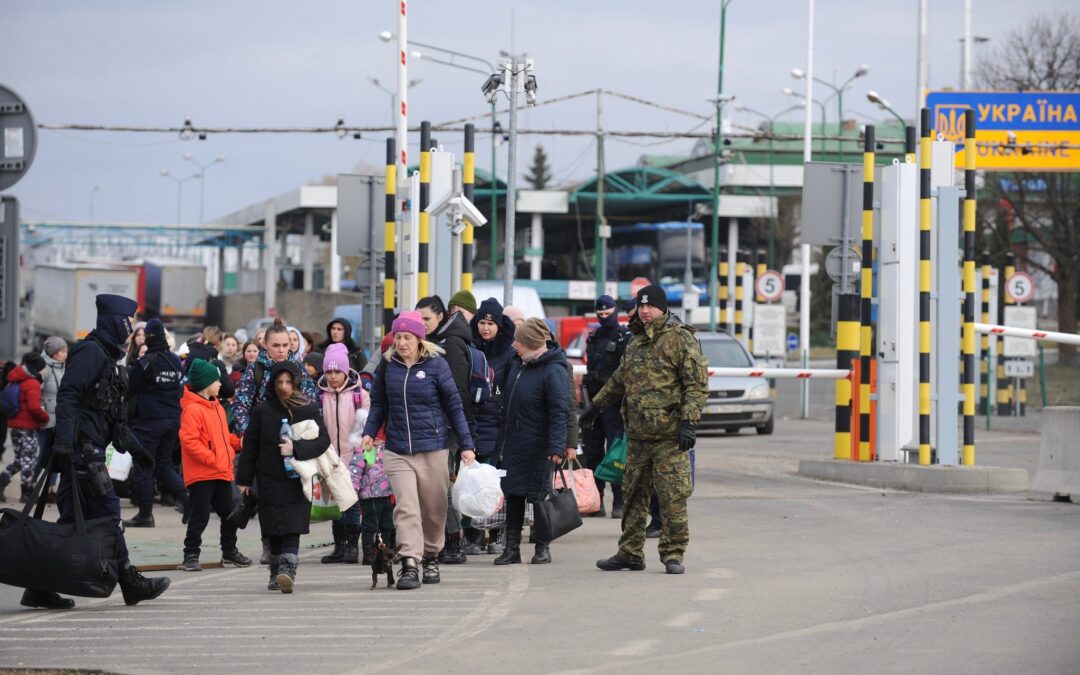The Polish government estimates that 1.3-1.4 million Ukraine refugees remain in the country one year on from Russia’s full-scale invasion.
After the Kremlin launched its attack, the first anniversary of which falls tomorrow, Poland became the primary destination for those fleeing the conflict, with millions crossing its border. Some subsequently moved on to other countries, while others were later able to return to Ukraine, but many remained.
“Today we estimate that around 1.3-1.4 million [Ukrainian refugees] are staying in Poland with the intention of staying longer,” deputy interior minister, Pawel Szafernaker told Polskie Radio today.
In a photo essay, we look at the lives of three of the million or so Ukrainian refugees who remain in Poland one year on from Russia's invasion: Liudmyla, a mother; Vlad, an amputee soldier; and Viktoria, a high-school student https://t.co/kdOpEgt2LB
— Notes from Poland 🇵🇱 (@notesfrompoland) February 21, 2023
He noted that overall 1.5 million Ukrainian refugees obtained a Polish national identification number – known as a PESEL – which allows them to access public services and social benefits.
Szafernaker added that the government estimates Polish families have hosted 1.6 million Ukrainian refugees in their homes since the invasion.
“This is an undertaking on a scale unimaginable in the world,” said the deputy minister. “The Polish people have opened their hearts, shown the world what solidarity is all about.”
Around 77% of Poles have been involved in helping refugees from Ukraine, for which purpose they spent around €2 billion out of their own pockets, a new study by @PIE_NET_PL has found https://t.co/xWu8JWNMui
— Notes from Poland 🇵🇱 (@notesfrompoland) July 28, 2022
A few weeks after the outbreak of war, parliament passed a law that provided allowances to families and organisations hosting refugees. They received 40 zloty (€8.41) per day per person they were hosting. The subsidies were later phased out.
Szafernaker also noted that Ukrainian refugees are for the most part adapting well to Polish society. “These are people who today, 80% of adults, have taken up employment in Poland,” he told Polskie Radio. “These are children who attend Polish schools.”.
According to the ministry of labour and family affairs, a simplified procedure introduced last year to grant Ukrainian refugees easier access to the labour market has been used over 900,000 times. Around 190,000 Ukrainian refugee children attend Polish schools and preschools, government data show.
A system introduced last year to give Ukrainian refugees easier access to Poland's labour market has been used over 900,000 times.
A minister welcomed the growing Ukrainian workforce, which “complements our labour market” and “pays taxes here in Poland” https://t.co/cQC9LbJTT1
— Notes from Poland 🇵🇱 (@notesfrompoland) February 13, 2023
Asked what the balance of costs of the refugees for Poland was, Szefernaker said it would be difficult to estimate given that, while the state has provided support, Ukrainians are also contributing to Poland’s economy.
“These are Ukrainian families who, to a large extent, work today for the Polish GDP, they pay taxes in Poland, they work legally in Poland. So it would be extremely difficult to create such a balance sheet that would show the actual costs incurred today,” he said.
According to OECD estimates, Poland spent €8.36 billion on maintaining refugees from Ukraine in 2022, the highest figure among the group’s member countries.
Poland will spend €8.4 billion on supporting refugees from Ukraine this year, the highest figure among @OECD countries, finds a new report.
Poles "showed unprecedented solidarity" towards the refugees, notes the OECD https://t.co/3yKJWZHIsr
— Notes from Poland 🇵🇱 (@notesfrompoland) October 14, 2022
Main image credit: EU Civil Protection and Humanitarian/Flickr (under CC BY-NC-ND 2.0)

Alicja Ptak is deputy editor-in-chief of Notes from Poland and a multimedia journalist. She has written for Clean Energy Wire and The Times, and she hosts her own podcast, The Warsaw Wire, on Poland’s economy and energy sector. She previously worked for Reuters.




















